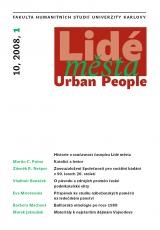Katolíci a levice
Pokus o rekonstrukci jednoho z „kontrakulturních“ intelektuálních proudů české společnosti meziválečného období
DOI:
https://doi.org/10.14712/12128112.3729Klíčová slova:
social Catholicism, Christian socialism, Czech literatureAbstrakt
The motif of social justice has always been present in Christianity; however, it has gained a new actuality with the onset of capitalism. Nineteenth century Czech culture shows an acute tendency towards “social preaching” (J.Š. Baar). Two types of “Catholic anti-capitalism” begin to form. On one hand, there is the moderate “Christian socialism” or “Christian solidarity”, asserted by official church structures (after the encyclic Rerum novarum) and by Christian socialist parties (in the Czech region, the chief theorist of “Christian sociology” was Bedřich Vašek). On the other hand, there’s the radical “mystic poverty”, stemming into various forms of “Catholic anarchy” or “mystic communism” (the influence of Léon Bloy on Czech Catholic authors), which does not, however, entirely dismiss that these very authors have sympathy for the ultra right-wing (Jaroslav Durych). A special case of the 1920’s is the amalgamation of Christian and socio-revolutionary motifs in the works of young left-wing poets around Jiří Wolker. This synthesis lasts for a short time and only within the so-called naïve, “boyish” stylisation: some of these authors later abandon the utilisation of Christian metaphors (Jiří Wolker), others on the contrary abandon the political left and convert to Catholicism (Zdeněk Kalista). The 1930’s bring another model of co-existence: the co-operation of Catholic and left-wing authors – in the field of “pure poetry” and legendary personal friendships across the idea front (Halas and Zahradníček). However, this coalition fell apart under the pressure of objective political events, especially the Spanish Civil War. After 1945, the social orientation of Catholicism is utilised by official propaganda of the Communist regime – a thus becomes untrustworthy and almost impossible for the Czech public to accept.
Stahování
Publikováno
Jak citovat
Číslo
Sekce
Licence

Tato práce je licencována pod Mezinárodní licencí Creative Commons Attribution-NonCommercial-NoDerivatives 4.0.


